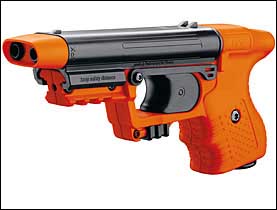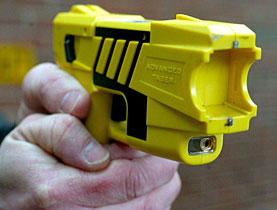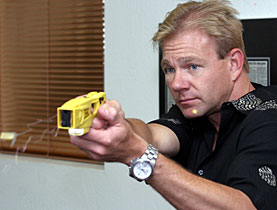Pepper-spray pistol aims to replace Tasers

Police and security forces around the world are buying Swiss pistols that fire a crippling burst of pepper spray, which the company claims is safer than a Taser.
But human rights group Amnesty International Switzerland questions this, saying both are dangerous and their effects unpredictable.
Unlike a can of pepper spray, the JPX Jet Protector pistol fires two 9.4-gram bursts of oleoresin capsicum, a cayenne pepper extract, with the help of a pyrotechnic charge. The solution rockets out of the barrel at 450 kph and has a range of about seven metres.
Raphael Fleischhauer, Piexon’s director of technology and manufacturing, volunteered to be shot with the device during its testing phase.
“It’s like getting a slash in the face,” he told swissinfo. “It’s a very strong pain. You can’t see for 30 minutes. It stops you completely.”
Since introducing the JPX 18 months ago, Piexon has now sold more than 1,000 copies of the device in about 20 countries, including Switzerland, where police in the southern canton of Ticino use it.
It is also part of the arsenal of German and Japanese police forces and used by the security staff of brewer Anheuser-Busch.
One JPX Protector pistol costs €300 (SFr439).
Dangerous or not?
Worldwide, the leading non-lethal weapon is the Taser, which immobilises people by firing barbed probes into targets to deliver an electrical shock.
“It has run into trouble though with killing people,” Fleischhauer said. “The JPX is an alternative with major stopping power that is clearly safer.”
A study funded by the United States Department of Justice and released on Wednesday found that Tasers ended conflicts with aggressive people 69 per cent of the time on the first try.
Amnesty International says more than 300 people died from being “tased” between 2001 and 2007.
“Any of these weapons are dangerous,” Daniel Graf, a Zurich-based spokesman with Amnesty International told swissinfo.
“The problem is that people think these are non-lethal weapons and therefore are more inclined to use them anytime they are afraid when they really have no idea exactly how they will affect the person they’re being used on.”
Earlier uses of canned pepper spray – not the JPX – did result in about five deaths because victims breathed solid irritants. They suffocated because they were at the same time handcuffed and hunched over, Fleischhauer said.
Not just police
Piexon, which is headquartered in canton Bern and has eight employees, markets the JPX as a security device with appeal beyond law enforcement.
A promotional video notes that parents could use it to protect themselves and children from aggressive dogs. Other, similar units could be affective in curbing domestic violence, the company says.
The pistol, which comes in black, orange or yellow, is more effective than traditional cans of pepper spray because it does not lose pressure or expel any solids, he said. A laser site helps with aiming.
swissinfo, Tim Neville
Piexon, a Swiss company, has been in business since 2000.
Along with the JPX pistol, the company also makes a smaller unit called the Guardian Angel that can be carried in a purse.
Oleoresin capsicum is reportedly more effective than tear gas when used against people under the influence of drugs or alcohol, Piexon says.
There have been numerous cases of Tasers being unable to stop aggressive people on methamphetamine or cocaine on the first charge.
A study funded by the US Department of Justice found that police dogs are often far more effective in stopping confrontations than Tasers or chemical sprays.
The study also noted that “despite negative media coverage touting abuse, multiple Taser deployments, delivered by probes or drive stun, may be necessary to obtain the effectiveness that agencies are seeking”.

In compliance with the JTI standards
More: SWI swissinfo.ch certified by the Journalism Trust Initiative




You can find an overview of ongoing debates with our journalists here. Please join us!
If you want to start a conversation about a topic raised in this article or want to report factual errors, email us at english@swissinfo.ch.